|
Singing duo Malka & Joso recorded four albums
Malka & Joso
Mr. Joso ©pralja was born in the city of Zadar, Croatia, while his parents
are from the town of ģman on Dugi otok (i.e., from Long Island in Croatia).
Malka & Joso singing Erev Shel Shoshanim (Evening Of Roses), Chi-ri-bim - welcoming the Sabbath
and Hava Nagila (Let's Rejoice)
Furthermore, listen to Croatian songs interpreted by Malka & Joso on
17. Tri Sulara, 22. Mala Mare
 
Malka and Joso
... In 1963, Malka and Joso Spralja formed the singing duo Malka & Joso. For the next four and half years, they sang folk songs of many lands in fourteen languages ‚ÄĒ well above ground: in Yorkville‚Äôs coffee houses, college campuses, supper clubs, radio and TV and Capitol recordings. Long after the duo parted, they‚Äôre regarded as a major force in bringing about the change in perception that saw the immigrant, the ethnic, the newcomer, not as aliens, but as importers of vitality, hope, daring, ancient and avant-garde sophistication, humour, and culture.
Their first album, Introducing Malka & Joso, recorded by Capitol EMI Canada, and released in both England and the United States, garnered rave reviews and outsold many of the label’s English-language albums.
‚ÄúAt a time when folk singers sang as if detached from their bodies and emotions, Malka & Joso came on the scene oozing sexuality and passion,‚ÄĚ recalls the painter Helen Lucas. ‚ÄúTheirs was a partnership that legends are made of.‚ÄĚ
‚ÄúMany of their renditions became classics,‚ÄĚ says master guitarist Eli Kassner. ‚ÄúThey made an immediate impact on the concert scene and went from success to success to become world famous.‚ÄĚ
‚ÄúIn ‚ÄėThe Great Folk ‚ÄúScare‚ÄĚ of the Sixties,‚Äô Malka & Joso were a rarity among those great artists,‚ÄĚ recalls Shelly Schultz, president of the William Morris Agency in New York.
Malka & Joso‚Äôs second album, Mostly Love Songs, came out in late 1965 ‚ÄĒ just as the duo won an RPM Award as the year‚Äôs Best Folk Group.
Their third album, Jewish Songs, featuring Hebrew and Yiddish songs, proved to be another bestseller.
Their fourth, Folk Songs Around the World, featured the best of the tracks from the Malka & Joso recordings. It was released in Britain, France, Holland, and Italy.
In the fall of 1966, Malka & Joso‚Äôs A World of Music TV show followed the Saturday night tradition Hockey Night in Canada. The weekly CBC series took the duo‚Äôs international repertoire into the living rooms of the nation. ‚Äú[Their] show projected an image of cosmopolitanism that is, let me say it, perfect,‚ÄĚ said the critic Robert Fulford, in the Toronto Star.
Malka & Joso Forever, a CD retrospective of their songs was released by EMI in 2001 to rave reviews. ‚ÄúAndrea Bocelli could learn a lot from Joso,‚ÄĚ declared the Globe and Mail. ‚ÄúBut Joso probably would not have been as effective without Malka‚Äôs alto sung in such an intimate heartfelt way as to make it seem like the sound of drying salt tears [or] full throated, like a field worker with both feet in the soil.‚ÄĚ
Sourc malkamarom.com
|
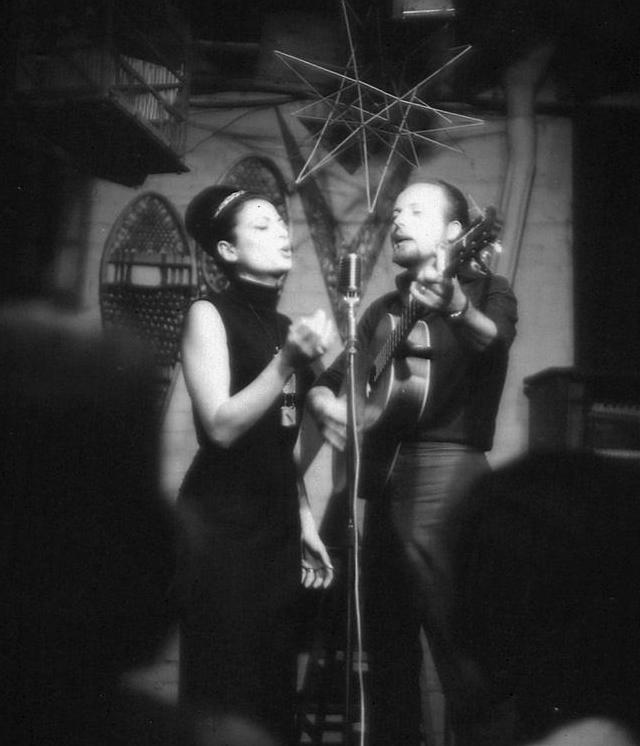  
Malka Marom was born and raised in Israel, the daughter of a cantor. She performed in the Dalia Festival and, as an actress, in the Israeli TV movie "The Village Tale."
After arriving in Canada she quickly became well known as a TV personality, panelist, dancer and singer.
Joso Spralja was born in the Croatian seaport of Dalmatia but left the fisherman trade that had been his family's means of revenue for ten generations. He helped to support his family by singing in cathedrals and theatres and was awarded a government scholarship to the Zagreb Conservatory where he studied under Europe's leading coaches. As a member of the renowned Sextette and performer on the operatic stage, he became one of leading entertainers.
After Joso arrived in Canada in 1962, he was introduced to Malka by performer Eli Kassner in Toronto's Yorkville district at an after-hours coffeehouse called The 71.
The duo began a partnership as an eclectic world music folk duo. Booking agent Sylvia train got them a house gig and they debuted at the Lord Simcoe Hotel in early 1963. Since Joso didn't know English, Malka introduced the songs, translated the lyrics, and invented stories to supplement the short songs that made up a set. Her self-deprecating humour and dramatic presentations of the material added dimension not only to the songs, but also to the personalities of the singers, and made their performance universal. This "filler" would become an integral part of their program. It has been long rumoured that the Eugene Levy and Catherine O'Hara folk characters from the mockumentary 'A Mighty Wind' is based on Malka & Joso.
In the summer of 1964, Malka & Joso played the Mariposa Folk Festival in Orillia, Ontario, on a bill with Ian & Sylvia, The Travellers, and rising star Gordon Lightfoot. By the following year, record retailer Sam Sniderman of Sam The Record Man became a fan and recommended them to Capitol Records Canada's A & R director of talent Paul White.
In December 1964, Malka & Joso went into Toronto's RCA Studios with guitarist Rafael Nunez and bassist Fred Muscat to begin recording their debut album. They recorded each song as though it was being performed live - vocals with instruments in one take. The recording session produced enough material for two albums.
'Introducing Malka & Joso' was released December 24, 1964 in Canada and in England and the United States in early January 1965. In the height of a Canadian winter, Malka & Joso went on a concert tour to the
Northwest Territories, the Prairies, and British Columbia. In Roblin, Manitoba, they were the first live professional concert the people had ever seen; when they were booked to sing at Powell River across the Georgia Strait in British Columbia a vicious snowstorm grounded their plane. Joso convinced a local fisherman to take them across the icy pass. It took four hours ato make the 35-mile journey, arriving at the theater with minutes to spare before stage time. Despite the weather, they didn't miss a single concert during the 20,000 mile tour.
Malka & Joso's second album, 'Mostly Love Songs' came out in late 1965 - just as the duo won an RPM Gold Leaf Award as the year's 'Best Folk Group'.
Their third album, 'Jewish Songs', featuring Hebrew and Yiddish songs, proved to be another bestseller. Their fourth, 'Folk Songs Around the World', featured "the best" of the tracks from the Malka & Joso recordings. It was released in Britain, France, Holland, and Italy.
In the fall of 1966, Malka & Joso's 'A World of Music' TV show followed the 'Hockey Night in Canada.'
On a recommendation from Gordon Lightfoot the William Morris talent agency booked them into Carnegie Hall, on concert tours, for club and TV appearances in the United States. They became favourites of Johnny Carson, Salvador Dali, and Samuel Bronfman. Before they dissolved their musical partnership in 1967, Malka & Joso were invited to represent Canada at a Royal Command Performance at the Canadian Centennial Ball.
Malka would also have several return solo engagements during August of 1967 at Montreal's Expo '67.
Malka & Joso, both married their respective spouses and had two children each. Both performers live part of the year in Canada and the other in their respective native lands. Today, Marom is better known as the author of the novel, "Sulha" and a writer/producer of many CBC documentaries. She was also, briefly, the host of her own TV chow on CITY-TV called 'Mosaic' in the 1980s; Joso is famous now for his restaurant, Joso's , which is among the most popular in Toronto.
As part of its 50th anniversary celebration in 2000, EMI Music Canada commissioned a study of its early years. Malka & Joso were among one of their long-lost re-discoveries. The result was the 'Malka & Joso Forever' CD anthology of the best material from their three original albums.
Singles
1965 Ay Cosita Linda/Katya Katerina (Capitol) 72241
2000 Malaguena/Gracious One (EMI Canada)
Albums
1964 Introducing: Malka & Joso (Capitol) ST-6108
1965 Mostly Love Songs (Capitol) ST-6129
1966 Jewish Songs (Capitol) ST-6169
1966 Folk Songs Around The World (Capitol)
1975 Jewish Songs (Capitol) SM-6432
2000 Malka & Joso Forever (Northern Heritage/EMI Canada)
Source jam.canoe.ca
| 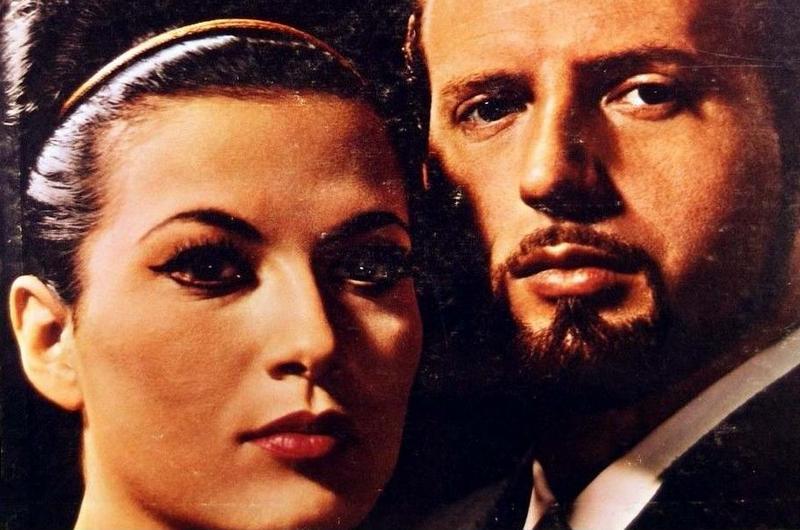 Malka & Joso
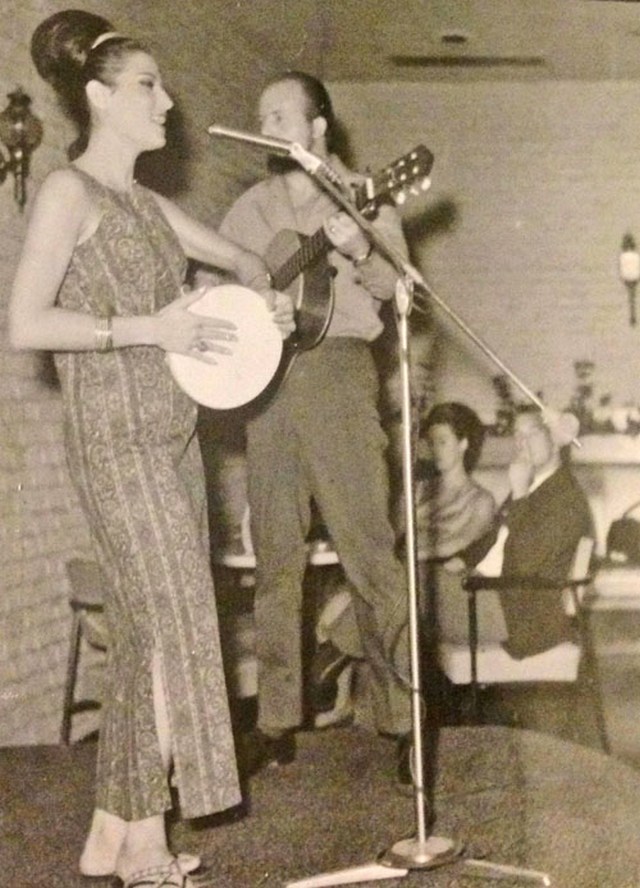  
Malka and Joso
Malka and Joso. Folksingers, active 1963-7: Malka Himel (b Kfar-Saba, Israel, 21 Jan 1936) and Joso Spralja (b Zadar, Croatia, 23 May 1929). Malka moved to Toronto in 1954, Joso in 1961. Both studied there.
Malka and Joso. Folksingers, active 1963-7: Malka Himel (b Kfar-Saba, Israel, 21 Jan 1936) and Joso Spralja (born in Zadar, Croatia, 23 May 1929). Malka moved to Toronto in 1954, Joso in 1961. Both studied there with Nellie Horvath. They met at the coffeehouse known as Yorkville 71 where Joso was singing and, after Malka had taught him various songs, made their debut together 1 Apr 1963 at the Lord Simcoe
Hotel. They appeared at the 1963 Mariposa Folk Festival, continued to sing in Toronto folk and supper clubs and in 1965 toured western Canada and the Yukon for Overture Concerts. In 1966 they were hosts for the CBC-TV series 'A Wonderful World of Music' and sang 26 November at Carnegie Hall, New York. They performed in 1967 in England. Malka and Joso made three LPs for Capitol: Introducing Malka and Joso (ST-6108), Mostly Love Songs (ST-6129), and Jewish Songs (ST-6169). A fourth, Malka et Joso - Autour du monde (ST-70.007), comprised selections from the other three. After 1967, Malka and Joso each pursued solo careers. Joso subsequently became a restaurateur and Malka turned to CBC radio work, her four-part documentary, 'A Bite of the Big Apple' (about the Broadway run of Kronborg: 1582 ) winning an ACTRA Award in
1977.
Suggested Reading
    Franklin, Stephen. 'Two at the top,' Weekend Magazine, 15 Jan 1966
    'The remaking of Malka,' Star Weekly, 25 May 1968
    Holtz, Patricia. 'Malka's mission,' The Canadian, 12 Feb 1977
    Livingstone, David. 'The Malka mystique,' Toronto Star, The City, 20 May 1979
Source www.thecanadianencyclopedia.ca
|  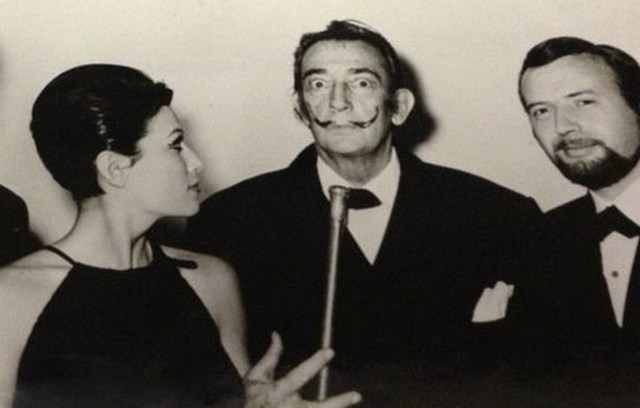  
Joso’s is a family run seafood restaurant located in downtown Toronto. It is renowned in many circles as the city’s finest Dalmatian (Croatian) fish restaurant.  Famous for its cuttlefish ink pasta and risotto nero, and its impeccable fresh fish selection, Joso’s stands out as a feast for your tastebuds, eyes and for that matter all of the senses. Located in a cozy home like setting, the interior is rich with culture, boasting provocative artwork, and Joso’s own artistic creations. Original Picasso and Dali artwork hang on the walls, as well as his own paintings and sculptures -  some made from the skin and bone of exotic fish. This sensory overload represents this family’s masterpiece, and serves to foreshadow the sensual delights that await their loyal customers.
As we begin our meal, we are immediately presented with an explanation of the day’s international fish selection.  The descriptions are poetic, and make it easy for us to make our menu choices. We begin with sharing a salad bowl, garnished with fresh kidney beans and chick peas. Expertly julienned green onions display the chef’s pride, and remind the diner of the care and attention that each plate has garnered before being set on the table. The next course in our feast is a fresh grilled Orada, and rich cuttlefish (sepia) ink spaghettini.  Both Joel and I agree that the fresh flavours are masterfully respected. 
We finish our meal with some homemade tiramisu, and crepes filled with sweet apricot purée, traditional of Dalmatian cuisine. We sip cherry liqueur and drink espresso and are now certain that Joso’s is a treat for all the senses. Joso’s serves to successfully arouse the palate, and kept us begging for more. Before leaving our conversation moves to how soon we can come back, so that we can spend more time taking in the eclectic and erotic art that surrounds us, not to mention the meticulously crafted meals put before us.
How long has Joso’s been open for business? 
We opened Joso’s in February of 1977 (at Avenue and Davenport). Before that we were a small coffeehouse in Yorkville catering to the hippie-beatnik crowd before Yorkville’s regentrification.  On the main floor there was an espresso bar, and Joso had an atelier on the second floor where he created his artwork, which is displayed in our restaurant. Even the sculptures are made by him personally.
What was the original concept for Joso’s? Has the concept changed?
Originally it was a bohemian coffee house, as well as an art and music studio. Joso and his wife would cook at home the typical Dalmatian (coast of Croatia) cuisine. As they started making octopus and calamari and trying it on the guests at the coffee house, they were encouraged by the guests to open a seafood restaurant. With that in mind, we started preparing more dishes yet our Octopus and Calamari are still on the menu today. The concept and execution remains exactly the same as it was all those years ago.
Art and food is clearly combined at Joso’s.  How do you feel this is important to the dining experience?
Whenever a new server will come in I always say ‚Äúwe feed our customers eyes, and their tummies‚ÄĚ and its part and parcel of the experience.¬† Most definitely our servers are like actors performing on a stage in front of our customers.¬† Joso always told me that you‚Äôre a moving object going back and forth, the audience‚Äôs eyes are drawn to your movement, and therefore one needs to smile and look pleasant.¬† This is all part of a great experience.
What is Joso’s connection to artist Salvador Dali?
Joso was once part of a singing duo named Malka and Joso and they sang on the CBC after the hockey Game.  They sang music in many languages, and travelled the world performing.  While playing at Carnegie hall Salvador Dali saw Joso and Malka perform.  He was blown away by Joso’s guitar and singing, and had his assistant personally invite him to stay at the St. Regis, and accompany him while he created his works at the hotel.  I think Joso was so enamoured and could not believe his eyes and ears when watching Dali work, that I think his artwork took off to another level.  That was a pivotal moment where he was completely wowed and his style was validated.
As a family run business, why is it important to keep the family involved?
It maintains the traditions and quality control of our food, because our family has the same cultural references.  As an example, in some cultures they love garlic when it has a little burn to it, and that aroma is part of the cuisine.  If you hire someone that enjoys that in their dish, it would change our whole cuisine. If the garlic is taken just a bit too far, it gives the wrong taste to our cooking.  It’s family that knows that taste because they have been raised with it.
What is the best part about living and working in Toronto?
We are so lucky in the city of Toronto that we have a fabulous tradition of eating out.  Because many people downtown live in condos, people want to get out.  I love the fact that there are the high, the middle and the low-end restaurants and the food trucks on the street.  Everything has its place; it’s about the passion people put in their business. It doesn’t have to be fancy or white table cloths, I just love anyone who’s making an effort in their cuisine.
How important is sustainability to your seafood selections.  Any restrictions on fish you will serve?
We are very aware about how our seafood is sourced, and we stay aware from anything that’s on the endangered list for sure.  We make sure that what we are feeding our clients is healthy and of the best quality.  We look to buy fish that are as unprocessed as possible as you have to be very selective about what product is the best one.  We also try to feed our customers some of the smaller fish because they say the mercury levels in the fish are lower.  We want to be offering healthy choices.
You are obviously very passionate about your product here at Joso’s.
Its our specialty and we’re really good at what we do. We have the longevity in the industry to prove it, and we’ll keep trying our best to be the best we can.
Thank you Shirley, you are just another reason why Toronto is awesome!
Source www.torontoisawesome.com
| 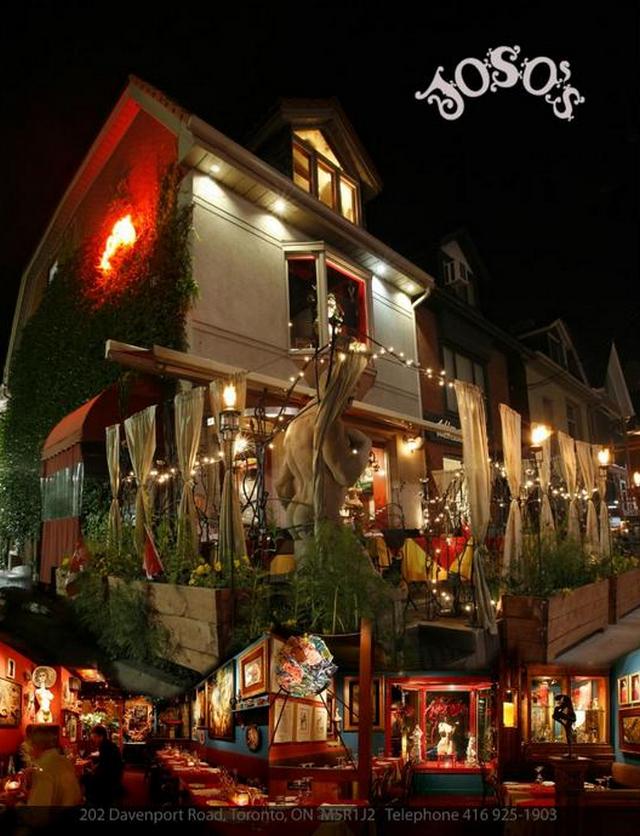 Joso ©pralja with his dughter Elena and wife Angiolina (his son Leo ©pralja is missing) in his native city of Zadar in Croatia in 2008. Source of the photo Filip Brala, 057info. Zadar is one of the most beautiful cities on the Meditranean. Two guitarists - Joso and Leo ©pralja, father and son. Photos from the their joint CD, Pisme more (Songs of the Sea), published in Zadar. Many thanks to prof.dr. Ana Marija Grancariś.
Formated for CROWN by Darko ģubriniś
Distributed by www.Croatia.org . This message is intended for Croatian Associations/Institutions and their Friends in Croatia and in the World. The opinions/articles expressed on this list do not reflect personal opinions of the moderator. If the reader of this message is not the intended recipient, please delete or destroy all copies of this communication and please, let us know!
|